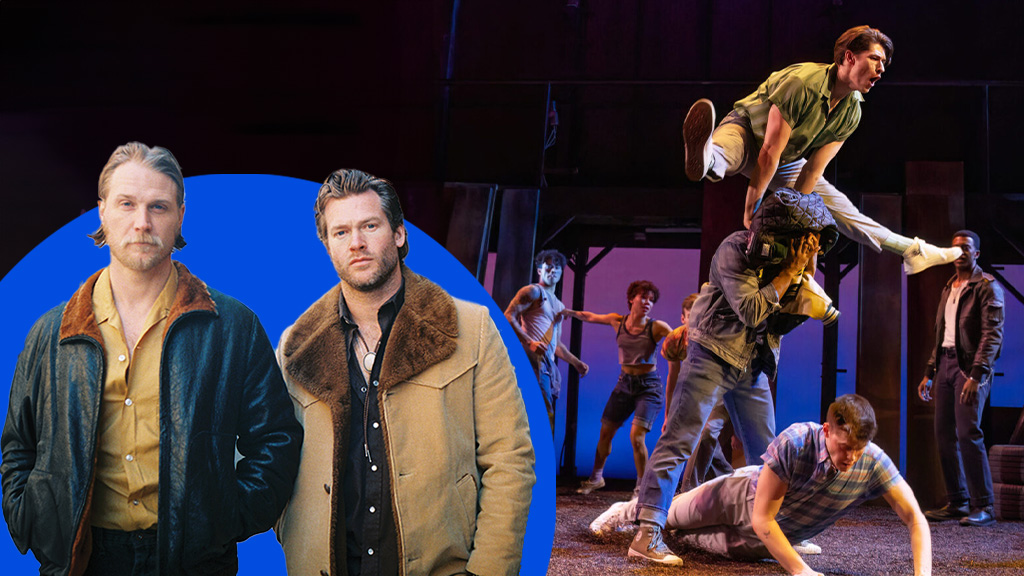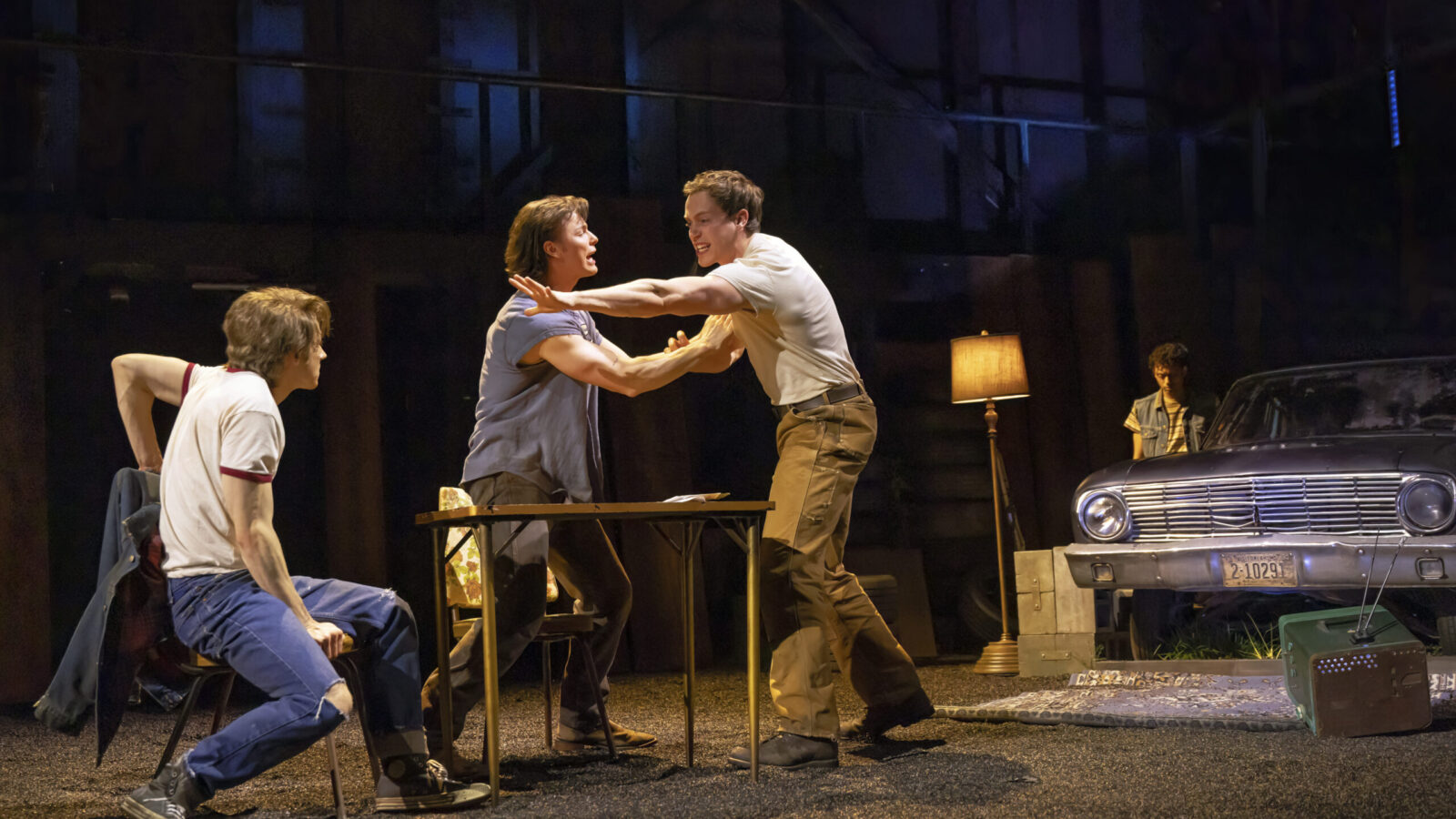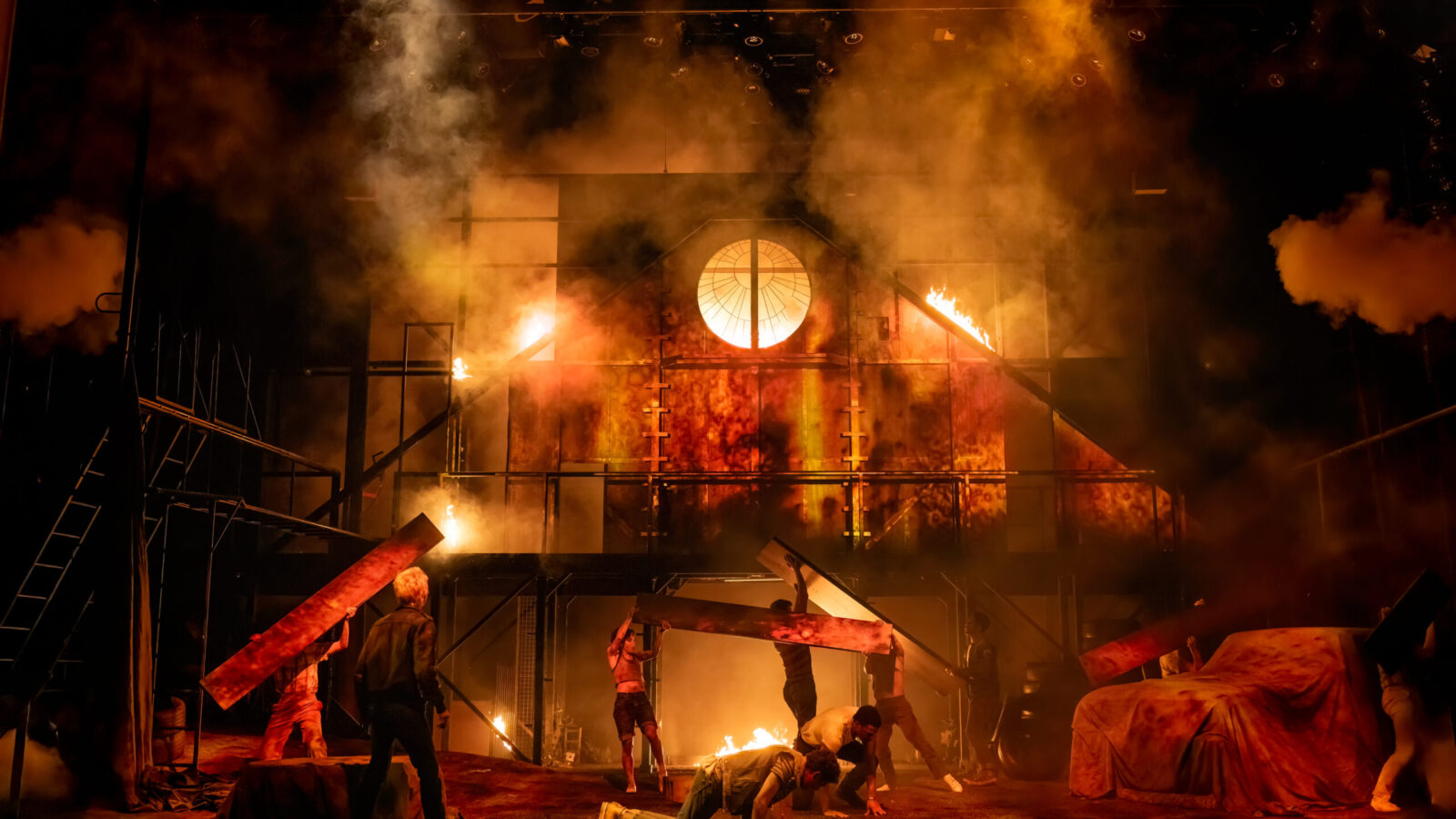
“They grew up on the outside of society. They weren’t looking for a fight. They were looking to belong.” S.E. Hinton penned those famous words when she was just sixteen years old.
Whether the budding author knew at the time that she was essentially writing the thesis for her landmark debut novel The Outsiders is unknown. But since its publication in 1967, the now-classic coming-of-age story has inspired—and riveted—generation after generation with its themes of class warfare, chosen family, loyalty, sacrifice and struggle.
In 1983, Francis Ford Coppola helmed a hit film adaptation of the book with a who’s who of future A-listers including Tom Cruise, Rob Lowe, Emilio Estevez, and Patrick Swayze. To this day, The Outsiders remains required reading in middle school classrooms around the country, and continually opens the eyes of young people to the power of literature.
Now, the beloved tale of Ponyboy Curtis and his fellow Greasers has found yet another life as a Broadway musical. Featuring a book by Pulitzer Prize finalist Adam Rapp and Justin Levine and a production team bolstered by stars like Coppola and Angelina Jolie, the stage adaptation found its unforgettable music and lyrics in a pair of unlikely Broadway outsiders: the Americana duo Jamestown Revival.
Since the release of their 2014 debut album Utah, bandmates Jonathan Clay and Zach Chance have made a name for themselves as talented folk troubadours with an indelible knack for soulful harmony and tapestry-spinning lyricism.
The duo’s journey from indie darlings to Broadway composers, however, was hardly a short road. In fact, the childhood pals from Magnolia, Texas have been attached to The Outsiders for almost nine years, having earned the gig after producers asked them to write a song on spec in the wake of releasing their 2016 sophomore album, The Education of a Wandering Man.

Still, it’s safe to say that seeing the project through to the finish line was worth more than just the satisfaction of reading their names in a playbill. Earlier this summer, The Outsiders took home the coveted trophy for Best Musical at the 2024 Tony Awards (as well as two more wins for Best Lighting Design in a Musical and Best Sound Design in a Musical), turning the guys of Jamestown Revival into not just Broadway composers, but bonafide Tony winners.
Below, Jonathan Clay of Jamestown Revival takes Ticketmaster into the process of adapting the classic novel for the Broadway stage, finding an added dose of literary inspiration in the work of Charles Dickens, why the message of The Outsiders remains so timeless, and more. You can also listen to the Original Broadway Cast Recording (via Sony Masterworks Broadway) now.
Congratulations on the Tony Award! How does it feel to be a Best Musical winner?
Thank you! It’s the ultimate validation as an artist, as a writer, to have your work accepted and to have your work applauded. There’s no greater feeling. Whether that’s from a fan of the show or a Tony voter on a committee, the validation feels so good.
You and Zack have been working on the show for nearly a decade now.
Yeah, we wrote the first song for this musical two weeks after my first son was born. He’s turning nine in July, so it’s been a while. But Zach and I have been writing songs together since we were 15.
Wow, that’s practically the age of Ponyboy and Johnny in the novel.
Exactly, which has been cool.
How did you first get involved when the show was being developed?
[The producers] were looking for a non-traditional band to write songs for the musical and they were familiar with us. They asked us to write a song on spec and we were happy to do it. The first song we wrote was “Stay Gold.” That’s the song at the end where Johnny gives Pony his letter. It’s sort of the whole meaning of the musical. It was the first song we wrote.
Did you have any personal connections to the book?
Yeah, I read it in eighth grade—it was one of the first books I read. My English teacher was a huge fan of it and she got us all reading it as students. What an honor to be able to take something like that, such a revered and influential piece of work, and put music to it. We’ve subsequently gotten to meet [author] S.E. Hinton, and getting her blessing was huge. It’s been really cool.
Do you remember what you first thought of the book back in middle school?
I thought the knives were really cool. [Laughs] In middle school, I thought pocket knives were really cool. I had a bunch of pocket knives and now I still keep a pocket knife in my pocket—not a switchblade, but a folder. I thought the story was so real and it felt relatable in seventh grade, eighth grade. You know, having a crush on a girl like Cherry. Everybody experiences that reverence and your first crush and trying to find your place—all those things that S.E. Hinton captured. It’s really cool.
After writing “Stay Gold,” how did you go about creating the sonic universe of the show?
I think our writing style came through naturally. But we really wanted to create character-specific universes. If you look at how Johnny sings, it’s very delicate. Johnny is like a wounded bird. The way he sings is different from the way, say, Darrel sings. Darrel has a lot of angst and he has a lot of weight on his shoulders, and his songs, they’re not, they’re not lofty. They don’t feel as good to sing because they shouldn’t—we didn’t want them to.
Ponyboy’s songs are very lofty and idealistic and he has a color to his songs. Dally, his songs, are confident and kind of cocky—he’s got swagger. It was really cool to write stylistically into the character versus giving something a certain style. From an overall perspective, it was more character-driven.

The show is set in 1967. Did you have any specific ’60s artists you referenced or looked to for inspiration?
A little bit. Some of that stuff is just inherent to what we do [as Jamestown Revival] anyways. Some Don Williams and Leon Russell, those elements start to creep in. But those are kind of influences on us inherently. So, I feel like it was kind of a natural fit.
Since the show’s score was so stylistically driven by character, was there any particular character that you enjoyed writing for the most?
Honestly, I think we really enjoyed Pony. With Pony, we had a lot of freedom. His songs needed to feel good to sing. We wrote some really crazy, challenging melodies. Brody [Grant] executes those songs flawlessly eight times a week.
We also really enjoyed writing from the three Curtis brothers’ perspective. Something like “Throwing in the Towel,” and “Soda’s Letter,” we got to do some three-part male harmonies. Soda has a really unique voice in the musical. Yeah, writing for the brothers was really fun.
As the middle brother, how would you describe Soda’s voice in the show?
He’s brevity and he’s not bogged down with paying the bills. He does take a bit of responsibility from an emotional perspective, trying to keep the family together. We call him the heart and soul of the family. He’s a little simpler, he’s love-driven, he’s feelings first. We made him a little bit more songwriter[-esque].
Going back to Pony, you’re already adapting The Outsiders, but one of his big moments on the show is the song “Great Expectations,” which ties, obviously, to the novel by Charles Dickens. Did you dive very much into Dickens or just use it as a jumping-off point for the song?
We totally dove into Dickens. We reference it in multiple songs, one of which is “Great Expectations.” We reference it again in “Far Away From Tulsa” on the bridge, “Like a house I’ve read in Dickens/ Where the walls are crumbling down/ I’m tired of blindly watching/ As we’re inching towards the ground,” talking about the house in Great Expectations.
Miss Havisham’s?
Yes, exactly. We referenced that a lot. We referenced it for bits and pieces to pull those in, but the book we obviously referenced the most was The Outsiders.
If I remember correctly, Tulsa is never actually mentioned explicitly in the book. But how did the sense of setting lend itself to the music? You guys being from Texas, it’s not that far away.
No, Texas and Oklahoma are kind of like cousins. You know the sounds of the cicadas in the summer, you know the sticky heat, you know the music. We share a lot of similarities in culture. It kind of felt like we were writing about our backyard. When the characters are talking about location, it really felt like we were able to go there in our heads.
Was there any song or moment in the score that was particularly difficult to capture or perfect?
Pony and Cherry’s scene and music. Obviously, Pony is enamored with Cherry; he’s taken by her. For instance, with “I Could Talk to You All Night,” we wanted to underscore that this wasn’t just love, this was actually a cerebral connection. We wanted to make it feel as platonic as we could. Obviously, there’s an underlying romanticism—it might be more of a one-way romanticism, and we really wanted to bring out the platonic nature of that.
We played around a lot with staging and lyrics and slight tweaks to not make it feel too “puppy love,” and actually make it feel like, “Wow, I really enjoyed this conversation. I want to talk to you again. I’ve never really connected with anybody, no one’s ever listened to me like this.” The book underscores that, versus “I think you’re really pretty” and “I think you’re cute, too.” It’s not about that, it was about the fact that they came from two totally different places, but they’re able to really connect on a cerebral level and that was the heart of their connection. They were able to break through to each other.
You said that you started this whole process with “Stay Gold.” How much did the song change from the original spec version nine years ago to what we hear at the end of the show?
It honestly did not change a single word. It was the least-changed song of the whole musical. It didn’t change at all until the pre-Broadway try-out at La Jolla Playhouse, where we added a third verse—that was it. Throughout this process, it was one of the least-changed songs of the entire score.
Wow, that’s actually kind of incredible, given what I know about Broadway development.
Yeah, it’s definitely an anomaly. We put it in a few different places and experimented with it. We knew it was good, but we didn’t know how best to utilize it. In La Jolla, it was actually sung at the hospital by Johnny. We realized it was so much more effective sung by Johnny’s ghost in tech in New York.
You also just released covers of “Midnight Rider” by The Allman Brothers Band and “A Never-Ending Song of Love” by Delaney & Bonnie & Friends, which was your first new music as Jamestown Revival since The Outsiders premiered. What can you tell me about those covers?
That was just like a little extracurricular side project that we did. We thought it would be fun to put those out. We actually got back in the studio a couple of weeks ago and recorded a couple of original songs. We’re getting back in the studio a couple weeks from now to record a couple more originals. We’ve got a lot of Jamestown stuff that’s in the can that we want to get out. There’s going to be a lot of music coming out toward the end of this year.
You’ve worked on it through so many albums of your own, but has this experience of doing The Outsiders and writing a Broadway score influenced your songwriting outside of the show?
Sure, I think so. Just being able to keep going back to a song, cracking a song back open, refining it. Writing songs about other people’s lives versus just our own. We really did a lot of that and I think every time you write a song, you get a little bit better. It was a lot of hours spent writing music, which I think has been really good for us.
The legacy of The Outsiders has lasted for more than half a century at this point, and now your music is a part of that. Why do you think the story still resonates so deeply after all this time?
It’s earnest. It’s real. It’s relatable. It’s not fantasy and it talks about identity. It talks about the human condition in a way that you can relate to it, no matter where you come from. That’s why I think it connects with people.
Tickets for The Outsiders are available on Ticketmaster.
Tags
You Might Like
Arts & Theatre
Dylan Mulvaney Is a “Woman Ahead Of Her Time“ in Broadway’s SIX
Don’t lose your heads, SIX fans: A new Boleyn girl is headed to take over pop herstory. Dylan Mulvaney is officially stepping into the shoes of Henry VIII’s ...
Arts & Theatre
Chilly Block Tango: Top Broadway Shows of February 2026
New York City may be deep in the throes of winter, but the lights of Broadway are continuing to burn bright. Top shows of the month include a viral dance ext...
Arts & Theatre
Step Inside Marquis Theatre, The Home of Stranger Things: The First Shadow
High above the New York City Theater District, the Marquis Theatre sits as one of the most unique venues on Broadway. The theater is located on the third flo...

